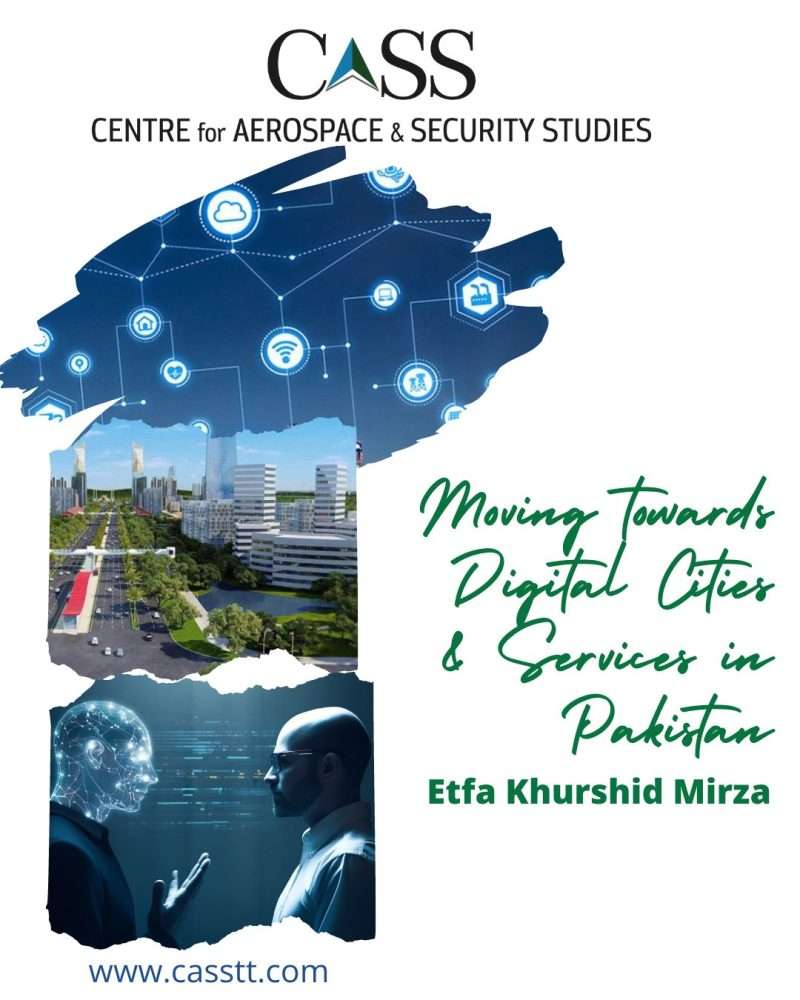With increased digitalisation, countries have integrated technology in various sectors and adopted data-driven solutions to improve living standards, increase productivity, and promote economic development. The terms ‘digital cities’ and ‘smart cities’ frequently make headlines, but they cater to different urban visions. While smart cities present a holistic approach, integrating various sectors for sustainable urban living, digital cities specifically focus on leveraging digital technologies and data to elevate urban experiences. This article examines the foundational areas behind digital cities and assesses how Pakistan can effectively integrate these technologies within its urban and rural environments.
Many cities around the world have embraced the idea of ‘digital cities’ and serve as an example for others. According to the Economist Impact’s ‘Digital Cities Index 2022’, Copenhagen, Amsterdam, Beijing, London, Seoul, New Delhi, Jakarta and New York etc. are the world’s top digital cities. The Index ranked 30 international cities based on four areas: their Connectivity, Services, Culture and Sustainability.
Digital cities optimise resource allocation, improve the delivery of services to the general public and encourage time-saving practices by harnessing technology. These developments are made possible to a great extent by digital infrastructure, which includes high-speed internet connectivity, smart grids, and integrated systems in a variety of industries, including healthcare, transportation, energy, education, and governance in general. Such cities rely on a complex ecosystem of interconnected devices, sensors, and data analytics to gather and process information in real time. This enables local government agencies to make decisions to enhance urban services such as smart transport systems, integrated waste management, health services, communication etc. For instance, smart transport systems keep an eye on traffic flow to facilitate passengers by optimising routes and reducing travel time. Integrated waste management streamlines collection schedules to reduce environmental impacts. Similarly, smart grids are used to promote renewable energy sources and optimise energy distribution. The cities ranked in the Economist Impact’s Index present a promising vision for the future and lessons for countries looking to integrate technology to improve their living standards.
Where does Pakistan stand in terms of areas like Connectivity, Services, Culture and Sustainability?
The country has huge potential for growth in the IT sector with around 18% aged between 18 and 25 years while 26% in the 26 to 35 age group; and an increasing number of internet users. By February 2023, the number of internet users had reached 87.35 million. The government launched the Digital Pakistan Policy in 2021 with the aim to establish a digital ecosystem through Software Technology Parks (STPs). Though the policy outlines key initiatives for ICT enablement and sectoral digitalisation, including e-Agriculture, e-Health, and e-Energy, there are challenges in terms of infrastructure, implementation and governance. For example, the country’s gig economy, which is 15% of our ICT exports needs a strong digital infrastructure. Plus, regardless of geographical or socioeconomic status, every citizen should have access to high-speed, uninterrupted and reliable internet services/connectivity. In May 2023, an internet blockade was enforced in Pakistan for three days, as a result of which the country’s dwindling economy suffered a huge loss of PKR 1.6 billion for telecom operators and PKR 570 million in tax revenues.
If we are to move towards digital cities that provide digital services, the government needs to develop a comprehensive system that enables individuals to have a unique and secure online identity, i.e., digital identity. In this regard, the role of the National Database and Registration Authority (NADRA), is crucial. Unfortunately, there have been data breaches in the past that raise questions about the reliability of the country’s largest database of its citizens. Hence, data security is imperative. Pakistan should develop robust measures in order to safeguard sensitive data and win the trust of its citizens in digital services.
We also need to inculcate a ‘digital culture’ in the country by increasing digital skills-focused training and education initiatives. There are initiatives such as the Digital Youth Hub under the Prime Minister Youth Programme to provide opportunities in education, employment, engagement and environment. However, without a proper policy on education and focused training, such programmes are likely to have limited impact.
For sustainable digital growth, effective collaboration between the public and private sectors is also imperative. To build scalable and sustainable digital solutions, Public-Private Partnerships (PPPs) can be key. Only by engaging with regional tech companies and promoting an innovative technology ecosystem through start-ups, and providing a conducive, safe and stable environment for investment, the country can strengthen its IT industry and digital landscape.
To conclude, digital cities offer a promising vision for the future as data and technology enable cities to become more effective, sustainable, and citizen-centric. However, in developing countries like Pakistan, implementing digital solutions may be hampered by scarce resources, lack of technical expertise, infrastructure, limited PPPs, education and training. Pakistan should draw inspiration from the best practices of leading global digital cities and tailor those insights to its distinct context in order to start moving towards a technologically advanced urban landscape, fostering progress and innovation for a digital-ready future.
Etfa Khurshid Mirza is a Research Assistant at the Centre for Aerospace & Security Studies (CASS), Islamabad, Pakistan. She can be reached at [email protected]
Design Credit: Mysha Dua Salman





